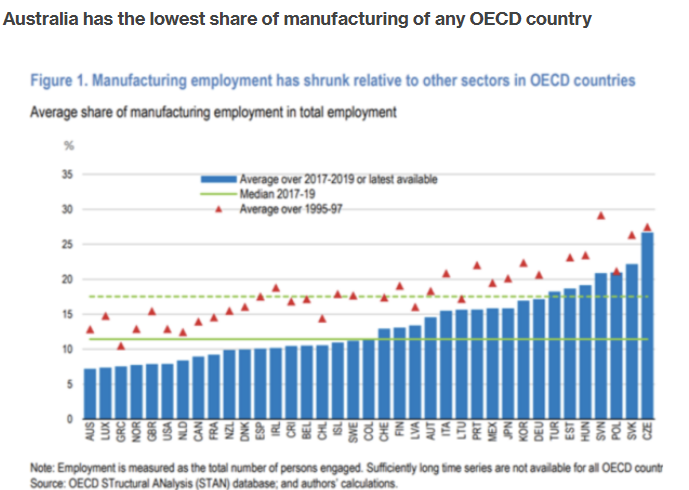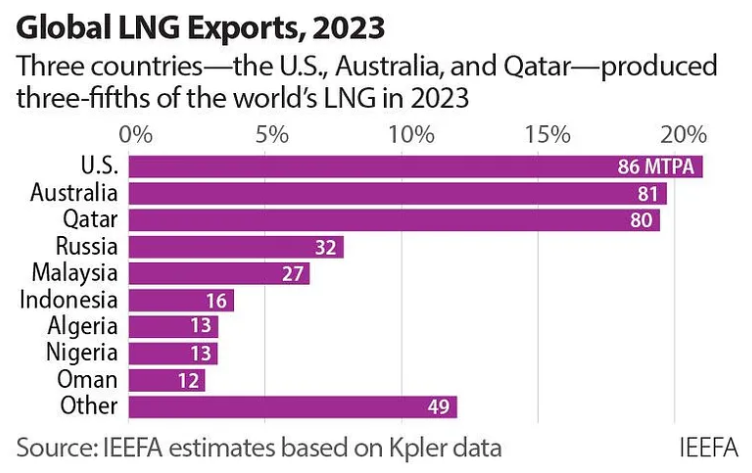Australia is rich in coal, gas, and sunlight. Low-cost energy used to be a competitive advantage for the nation.
However, through pure incompetence and “net zero” pig-headedness, our policymakers turn energy into a cost-of-living nightmare and competitive disadvantage for the nation.
Already this year, we have witnessed Qenos – Australia’s last plastics manufacturer – shut down due to high energy prices.
Qenos’ announcement to close came amid Australia’s manufacturing share falling to the lowest level in the OECD.

Multiple other major manufacturers, including Nestle and PepsiCo, have also threatened to leave Australia due to high energy costs.
On Wednesday, ABC News reported on how South Australian businesses are being hammered by surging electricity costs, which is threatening their viability and resulting in cost inflation.
Adelaide bakery Vili’s, which has 350 staff and produces about 50,000 pies daily, has been hit with 22% increase in electricity costs, which will add 25 cents to the cost of a pie.
“Our energy bills are around the $500,000 mark, and obviously our increase on top of that, well, you know, we’re looking at roughly an extra $100,000 on top of that number”, manager Peter Utry said.
“We understand that everybody’s doing it tough, but as a business, if you’re not passing your increased costs onto your customers, you’re not going to have a business”.
South Australian ice cream maker Golden North renewed its electricity contract in January and was hit with a 50% rise in electricity costs.
“So that increase … is worth $197,000 a year. So our power’s gone up from just over $400,000 to just over $600,000 a year”, Operations manager Rick Willis said.
Last week dairy producer Beston Global Food Company cited onerous energy prices as a key factor behind it entering administration, placing 160 jobs at risk.
Australian Industry Group CEO Innes Willox said that Australian energy prices spiked in 2022 because of conflict overseas.
“Australia used to be historically very cheap when it came to energy. That was one of our great competitive advantages, and we’ve lost that advantage”, he said.
“It’s always heartbreaking when you hear of companies [shutting] their doors because of energy prices”.
“If we start losing local businesses that are energy reliant, we lose the heart and soul of the community that we live in”, Willox said.
How can Australia expect to be competitive in manufacturing with high-cost energy due to policy failure?
East Coast Australia is a major gas exporter, sending more than 70% of its gas supply overseas, particularly to China.
However, because there is no domestic gas reservation mechanism in place on the East Coast, Australians pay globally high energy prices.
Australia’s high gas prices have pushed up electricity prices, further increasing costs for businesses and households.
Meanwhile, China and Japan are receiving more Australian gas than they require and are re-exporting it to third countries for profit.
If the Albanese government simply followed Western Australia and every other gas exporter on the planet and set aside a reasonable portion of our East Coast export gas for domestic consumption while regulating its cost using traditional cost-plus pricing, Australia would have low-cost gas and electricity, as well as a more competitive manufacturing sector.
Australia’s manufacturing would expand on its own, without the need for government subsidies, because low-cost energy would become a comparative advantage rather than a disadvantage.
Western Australia has low gas and electricity prices, despite being a significant gas exporter.
The United States is now the world’s largest gas exporter, yet domestic prices remain low (less than US$2.50 per gigajoule) thanks to its gas reservation policy. The United States has also decreased carbon emissions by transitioning from coal to gas.

If the federal government fixes the East Coast gas market through reservation and cost-plus price regulation, then energy costs will plummet, our manufacturing industry will become significantly more competitive, and overall inflation and cost-of-living pressures will abate.
However, if it continues to pander to foreign governments and the gas cartel, keeping gas and electricity prices high, then cost-push inflation will run rampant and only taxpayer-subsidised industry will remain in Australia.
Australia’s economic future depends on affordable energy.

